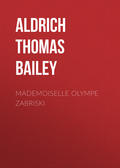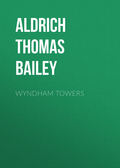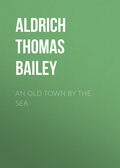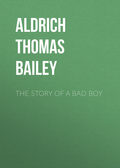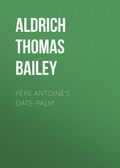
Aldrich Thomas Bailey
The Stillwater Tragedy
Presently his abject attitude and expression began to touch Margaret; there was something that appealed to her in the thin gray hair fallowing over his forehead. Her eyes softened as they rested upon him, and a pitying little tremor came to her under lip.
"Papa," she said, stooping to his side, with a sudden rosy bloom in her cheeks, "I have all the proof I want that Richard knew nothing of this dreadful business."
"You have proof!" exclaimed Mr. Slocum, starting from his seat.
"Yes. The morning Richard went to New York"–Margaret hesitated.
"Well!"
"He put his arm around me and kissed me."
"Well!"
"Well?" repeated Margaret. "Could Richard have done that,–could he have so much as laid his hand upon me–if–if"–
Mr. Slocum sunk back in the chair with a kind of groan.
"Papa, you do not know him!"
"Oh, Margaret, I am afraid that that is not the kind of evidence to clear Richard in Mr. Taggett's eyes."
"Then Richard's word must do it," she said haughtily. "He will be home to-night."
"Yes, he is to return to-night," said Mr. Slocum, looking away from her.
XXII
During the rest of the day the name of Richard Shackford was not mentioned again by either Margaret or her father. It was a day of suspense to both, and long before night-fall Margaret's impatience for Richard to come had resolved itself into a pain as keen as that with which Mr. Slocum contemplated the coming; for every hour augmented his dread of the events that would necessarily follow the reappearance of young Shackford in Stillwater.
On reaching his office, after the conversation with Margaret, Mr. Slocum found Lawyer Perkins waiting for him. Lawyer Perkins, who was as yet in ignorance of the late developments, had brought information of his own. The mutilated document which had so grimly clung to its secret was at last deciphered. It proved to be a recently executed will, in which the greater part of Lemuel Shackford's estate, real and personal, was left unconditionally to his cousin.
"That disposes of one of Mr. Taggett's theories," was Mr. Slocum's unspoken reflection. Certainly Richard had not destroyed the will; the old man himself had destroyed it, probably in some fit of pique. Yet, after all, the vital question was in no way affected by this fact; the motive for the crime remained, and the fearful evidence against Richard still held.
After the departure of Lawyer Perkins, who had been struck by the singular perturbation of his old friend, Mr. Slocum drew forth Mt. Taggett's journal, and re-read it from beginning to end. Margaret's unquestioning faith in Richard, her prompt and indignant rejection of the whole story, had shaken her father at moments that morning; but now his paralyzing doubts returned. This second perusal of the diary impressed him even more strongly than the first. Richard had killed Lemuel Shackford,–in self-defense, may be, or perhaps accidentally; but he had killed him! As Mr. Slocum passed from page to page, following the dark thread of narrative that darkened at each remove, he lapsed into that illogical frame of mind when one looks half expectantly for some providential interposition to avert the calamity against which human means are impotent. If Richard were to drop dead in the street! If he were to fall overboard off Point Judith in the night! If only anything would happen to prevent his coming back! Thus the ultimate disgrace might be spared them. But the ill thing is the sure thing; the letter with the black seal never miscarries, and Richard was bound to come! "There is no escape for him or for us," murmured Mr. Slocum, closing his finger in the book.
It was in a different mood that Margaret said to herself, "It is nearly four o'clock; he will be here at eight!" As she stood at the parlor window and watched the waning afternoon light making its farewells to the flower-beds in the little square front-gardens of the houses opposite, Margaret's heart was filled with the tenderness of the greeting she intended to give Richard. She had never been cold or shy in her demeanor with him, nor had she ever been quite demonstrative; but now she meant to put her arms around his neck in a wifely fashion, and recompense him so far as she could for all the injustice he was to suffer. When he came to learn of the hateful slander that had lifted its head during his absence, he should already be in possession of the assurance of her faith.
In the mean while the hands in Slocum's Yard were much exercised over the unaccountable disappearance of Blake. Stevens reported the matter to Mr. Slocum.
"Ah, yes," said Mr. Slocum, who had not provided himself with an explanation, and was puzzled to improvise one. "I discharged him,–that is to say, I let him go. I forgot to mention it. He didn't take to the trade."
"But he showed a good fist for a beginner," said Stevens. "He was head and shoulders the best of the new lot. Shall I put Stebbins in his place?"
"You needn't do anything until Mr. Shackford gets back."
"When will that be, sir?"
"To-night, probably."
The unceremonious departure of Blake formed the theme of endless speculation at the tavern that evening, and for the moment obscured the general interest in old Shackford's murder.
"Never to let on he was goin'!" said one.
"Didn't say good-by to nobody," remarked a second.
"It was devilish uncivil," added a third.
"It is kind of mysterious," said Mr. Peters.
"Some girl," suggested Mr. Willson, with an air of tender sentiment, which he attempted further to emphasize by a capricious wink.
"No," observed Dexter. "When a man vanishes in that sudden way his body is generally found in a clump of blackberry bushes, months afterwards, or left somewhere on the flats by an ebb tide."
"Two murders in Stillwater in one month would be rather crowding it, wouldn't it?" inquired Piggott.
"Bosh!" said Durgin. "There was always something shady about Blake. We didn't know where he hailed from, and we don't know where he's gone to. He'll take care of himself; that kind of fellow never lets anybody play any points on him." With this Durgin threw away the stump of his cigar, and lounged out at the street door.
"I couldn't get anything out of the proprietor," said Stevens; "but he never talks. May be Shackford when he"–Stevens stopped short to listen to a low, rumbling sound like distant thunder, followed almost instantly by two quick faint whistles. "He's aboard the train to-night."
Mr. Peters quietly rose from his seat and left the bar-room.
The evening express, due at eight, was only a few seconds behind time. As the screech of the approaching engine rung out from the dark wood-land, Margaret and her father exchanged rapid glances. It would take Richard ten minutes to walk from the railway station to the house,–for of course he would come there directly after sending his valise to Lime Street.
The ten minutes went by, and then twenty. Margaret bent steadily over her work, listening with covert intentness for the click of the street gate. Likely enough Richard had been unable to find any one to take charge of his hand-baggage. Presently Mr. Slocum could not resist the impulse to look at his watch. It was half past eight. He nervously unfolded The Stillwater Gazette, and sat with his eyes fastened on the paper.
After a seemingly interminable period the heavy bell of the South Church sounded nine, and then tolled for a few minutes, as the dismal custom is in New England country towns.
A long silence followed, unrelieved by any word between father and daughter,–a silence so profound that the heart of the old-fashioned time-piece, throbbing monotonously in its dusky case at the foot of the stairs, made itself audible through the room. Mr. Slocum's gaze continued fixed on the newspaper which he was not reading. Margaret's hands lay crossed over the work on her lap.
Ten o'clock.
"What can have kept him?" murmured Margaret.
"There was only that way out of it," reflected Mr. Slocum, pursuing his own line of thought.
Margaret's cheeks were flushed and hot, and her eyes dulled with disappointment, as she rose from the low rocking-chair and crossed over to kiss her father good-night. Mr. Slocum drew the girl gently towards him, and held her for a moment in silence. But Margaret, detecting the subtile commiseration in his manner, resented it, and released herself coldly.
"He has been detained, papa."
"Yes, something must have detained him!"
XXIII
When the down express arrived at Stillwater, that night, two passengers stepped from the rear car to the platform: one was Richard Shackford, and the other a commercial traveler, whose acquaintance Richard had made the previous evening on the Fall River boat.
There were no hacks in waiting at the station, and Richard found his politeness put to a severe test when he saw himself obliged to pilot his companion part of the way to the hotel, which lay–it seemed almost maliciously–in a section of the town remote from the Slocums'. Curbing his impatience, Richard led the stranger through several crooked, unlighted streets, and finally left him at the corner of the main thoroughfare, within pistol-shot of the red glass lantern which hung over the door of the tavern. This cost Richard ten good minutes. As he hurriedly turned into a cross-street on the left, he fancied that he heard his name called several times from somewhere in the darkness. A man came running towards him. It was Mr. Peters.
"Can I say a word to you, Mr. Shackford?"
"If it isn't a long one. I am rather pressed."
"It is about Torrini, sir."
"What of him?"
"He's mighty bad, sir."
"Oh, I can't stop to hear that," and Richard quickened his pace.
"The doctor took off his hand last Wednesday," said Peters, keeping alongside, "and he's been getting worse and worse."
Richard halted. "Took off his hand?"
"Didn't you know he was caught in the rolling-machine at Dana's? Well, it was after you went away."
"This is the first I've heard of it."
"It was hard lines for him, sir, with the woman and the two children, and nothing to eat in the house. The boys in the yard have done what they could, but with the things from the drug-store, and so on, we couldn't hold up our end. Mr. Dana paid the doctor's bill, but if it hadn't been for Miss Slocum I don't know what would have happened. I thought may be if I spoke to you, and told you how it was"–
"Did Torrini send you?"
"Lord, no! He's too proud to send to anybody. He's been so proud since they took off his hand that there has been no doing anything with him. If they was to take off his leg, he would turn into one mass of pride. No, Mr. Shackford, I came of myself."
"Where does Torrini live, now?"
"In Mitchell's Alley."
"I will go along with you," said Richard, with a dogged air. It seemed as if the fates were determined to keep him from seeing Margaret that night. Peters reached out a hand to take Richard's leather bag. "No, thank you, I can carry it very well." In a small morocco case in one of the pockets was a heavy plain gold ring for Margaret, and not for anything in the world would Richard have allowed any one else to carry the bag.
After a brisk five minutes' walk the two emerged upon a broad street crossing their path at right angles. All the shops were closed except Stubbs the provision dealer's and Dundon's drug-store. In the window of the apothecary a great purple jar, with a spray of gas jets behind it, was flaring on the darkness like a Bengal light. Richard stopped at the provision store and made some purchases; a little further on he halted at a fruit stand, kept by an old crone, who had supplemented the feeble flicker of the corner street lamp with a pitch-pine torch, which cast a yellow bloom over her apples and turned them all into oranges. She had real oranges, however, and Richard selected half a dozen, with a confused idea of providing the little Italians with some national fruit, though both children had been born in Stillwater.
Then the pair resumed their way, Peters acting as pioneer. They soon passed beyond the region of sidewalks and curbstones, and began picking their steps through a narrow, humid lane, where the water lay in slimy pools, and the tenement houses on each side blotted out the faint starlight. The night was sultry, and door and casement stood wide, making pits of darkness. Few lights were visible, but a continuous hum of voices issued from the human hives, and now and then a transient red glow at an upper window showed that some one was smoking a pipe. This was Mitchell's Alley.
The shadows closed behind the two men as they moved forward, and neither was aware of the figure which had been discreetly following them for the last ten minutes. If Richard had suddenly wheeled and gone back a dozen paces, he would have come face to face with the commercial traveler.
Mr. Peters paused in front of one of the tenement houses, and motioned with his thumb over his shoulder for Richard to follow him through a yawning doorway. The hall was as dark as a cave, and full of stale, moldy odors. Peters shuffled cautiously along the bare boards until he kicked his toe against the first step of the staircase.
"Keep close to the wall, Mr. Shackford, and feel your way up. They've used the banisters for kindling, and the landlord says he shan't put in any more. I went over here the other night," added Mr. Peters reminiscentially.
After fumbling several seconds for the latch, Mr. Peters pushed open a door, and ushered Richard into a large, gloomy rear room. A kerosene lamp was burning dimly on the mantel-shelf, over which hung a coarsely-colored lithograph of the Virgin in a pine frame. Under the picture stood a small black crucifix. There was little furniture,–a cooking-stove, two or three stools, a broken table, and a chest of drawers. On an iron bedstead in the corner lay Torrini, muffled to the chin in a blanket, despite the hot midsummer night. His right arm, as if it were wholly disconnected with his body, rested in a splint on the outside of the covering. As the visitors entered, a tall dusky woman with blurred eyes rose from a low bench at the foot of the bed.
"Is he awake?" asked Peters.
The woman, comprehending the glance which accompanied the words, though not the words themselves, nodded yes.
"Here is Mr. Shackford come to see you, Torrini," Peters said.
The man slowly unclosed his eyes; they were unnaturally brilliant and dilated, and seemed to absorb the rest of his features.
"I didn't want him."
"Let by-gones be by-gones, Torrini," said Richard, approaching the bedside. "I am sorry about this."
"You are very good; I don't understand. I ask nothing of Slocum; but the signorina comes every day, and I cannot help it. What would you have? I'm a dead man," and he turned away his face.
"It is not so bad as that," said Richard.
Torrini looked up with a ghastly smile. "They have cut off the hand that struck you, Mr. Shackford."
"I suppose it was necessary. I am very sorry. In a little while you will be on your feet again."
"It is too late. They might have saved me by taking the arm, but I would not allow them. I may last three or four days. The doctor says it."
Peters, standing in the shadow, jerked his head affirmatively.
"I do not care for myself," the man continued,–"but she and the little ones–That is what maddens me. They will starve."
"They will not be let starve in Stillwater," said Richard.
Torrini turned his eyes upon him wistfully and doubtfully. "You will help them?"
"Yes, I and others."
"If they could be got to Italy," said Torrini, after meditating, "it would be well. Her farther," giving a side look at the woman, "is a fisherman of Capri." At the word Capri the woman lifted her head quickly. "He is not rich, but he's not poor; he would take her."
"You would wish her sent to Naples?"
"Yes."
"If you do not pull through, she and the children shall go there."
"Brigida!" called Torrini; then he said something rapidly in Italian to the woman, who buried her face in both hands, and did not reply.
"She has no words to thank you. See, she is tired to death, with the children all day and me all night,–these many nights."
"Tell her to go to bed in the other room," said Richard. "There's another room, isn't there? I'll sit with you."
"You?"
"Your wife is fagged out,–that is plain. Send her to bed, and don't talk any more. Peters, I wish you'd run and get a piece of ice somewhere; there's no drinking-water here. Come, now, Torrini, I can't speak Italian. Oh, I don't mind your scowling; I intend to stay."
Torrini slowly unknitted his brows, and an irresolute expression stole across his face; then he called Brigida, and bade her go in with the children. She bowed her head submissively, and fixing her melting eyes on Richard for an instant passed into the adjoining chamber.
Peters shortly reappeared with the ice, and after setting a jug of water on the table departed. Richard turned up the wick of the kerosene lamp, which was sending forth a disagreeable odor, and pinned an old newspaper around the chimney to screen the flame. He had, by an odd chance, made his lampshade out of a copy of The Stillwater Gazette containing the announcement of his cousin's death. Richard gave a quick start as his eye caught the illuminated head-lines,–Mysterious Murder of Lemuel Shackford! Perhaps a slight exclamation escaped Richard's lips at the same time, for Torrini turned and asked what was the matter. "Nothing at all," said Richard, removing the paper, and placing another in its stead. Then he threw open the blinds of the window looking on the back yard, and set his hand-bag against the door to prevent it being blown to by the draught. Torrini, without altering the rigid position of his head on the pillow, followed every movement with a look of curious insistence, like that of the eyes in a portrait. His preparations completed for the night, Richard seated himself on a stool at the foot of the bed.
The obscurity and stillness of the room had their effect upon the sick man, who presently dropped into a light sleep. Richard sat thinking of Margaret, and began to be troubled because he had neglected to send her word of his detention, which he might have done by Peters. It was now too l ate. The town clock struck ten in the midst of his self-reproaches. At the first clang of the bell, Torrini awoke with a start, and asked for water.
"If anybody comes," he said, glancing in a bewildered, anxious way at the shadows huddled about the door, "you are not to leave me alone with him."
"Him? Whom? Are you expecting any one?"
"No; but who knows? one might come. Then, you are not to go; you are not to leave me for a second."
"I've no thought of it," replied Richard; "you may rest easy.... He's a trifle light in the head," was Richard's reflection.
After that Torrini dozed rather than slumbered, rousing at brief intervals; and whenever he awoke the feverish activity of his brain incited him to talk,–now of Italy, and now of matters connected with his experiences in this country.
"Naples is a pleasant place!" he broke out in the hush of the midnight, just as Richard was dropping off. "The band plays every afternoon on the Chiaia. And then the festas,--every third day a festa. The devil was in my body when I left there and dragged little Brigida into all this misery. We used to walk of an evening along the Marinella,–that's a strip of beach just beyond the Molo Piccolo. You were never in Naples?"
"Not I," said Richard. "Here, wet your lips, and try to go to sleep again."
"No, I can't sleep for thinking. When the Signorina came to see me, the other day, her heart was pierced with pity. Like the blessed Madonna's, her bosom bleeds for all! You will let her come to-morrow?"
"Yes, yes! If you will only keep quiet, Margaret shall come."
"Margherita, we say. You are to wed her,–is it not so?"
Richard turned down the wick of the lamp, which was blazing and spluttering, and did not answer. Then Torrini lay silent a long while, apparently listening to the hum of the telegraph wires attached to one end of the roof. At odd intervals the freshening breeze swept these wires, and awoke a low æolian murmur. The moon rose in the mean time, and painted on the uncarpeted floor the shape of the cherry bough that stretched across the window. It was two o'clock; Richard sat with his head bent forward, in a drowse.
"Now the cousin is dead, you are as rich as a prince,–are you not?" inquired Torrini, who had lain for the last half hour with his eyes wide open in the moonlight.
Richard straightened himself with a jerk.
"Torrini, I positively forbid you to talk any more!"
"I remember you said that one day, somewhere. Where was it? Ah, in the yard! 'You can't be allowed to speak here, you know.' And then I struck at you,–with that hand they've taken away! See how I remember it!"
"Why do you bother your mind with such things? Think of just nothing at all, and rest. Perhaps a wet cloth on your forehead will refresh you. I wish you had a little of my genius for not keeping awake."
"You are tired, you?"
"I have had two broken nights, traveling."
"And I give you no peace?"
"Well, no," returned Richard bluntly, hoping the admission would induce Torrini to tranquilize himself, "you don't give me much."
"Has any one been here?" demanded Torrini abruptly.
"Not a soul. Good Heaven, man, do you know what time it is?"
"I know,–I know. It's very late. I ought to keep quiet; but, the devil! with this fever in my brain!… Mr. Shackford!" and Torrini, in spite of his imprisoned limb, suddenly half raised himself from the mattress. "I–I"–
Richard sprung to his feet. "What is it,–what do you want?"
"Nothing," said Torrini, falling back on the pillow.
Richard brought him a glass of water, which he refused. He lay motionless, with his eyes shut, as if composing himself, and Richard returned on tiptoe to his bench. A moment or two afterwards Torrini stirred the blanket with his foot.
"Mr. Shackford!"
"Well?"
"I am as grateful–as a dog."
Torrini did not speak again. This expression of his gratitude appeared to ease him. His respiration grew lighter and more regular, and by and by he fell into a profound sleep. Richard watched awhile expectantly, with his head resting against the rail of the bedstead; then his eyelids drooped, and he too slumbered. But once or twice, before he quite lost himself, he was conscious of Brigida's thin face thrust like a silver wedge through the half-open door of the hall bedroom. It was the last thing he remembered,–that sharp, pale face peering out from the blackness of the inner chamber as his grasp loosened on the world and he drifted off on the tide of a dream. A narrow white hand, like a child's, seemed to be laid against his breast. It was not Margaret's hand, and yet it was hers. No, it was the plaster model he had made that idle summer afternoon, years and years before he had ever thought of loving her. Strange for it to be there! Then Richard began wondering how the gold ring would look in the slender forefinger. He unfastened the leather bag and took out the ring. He was vainly trying to pass it over the first joint of the dead white finger, when the cast slipped from his hold and fell with a crash to the floor. Richard gave a shudder, and opened his eyes. Brigida was noiselessly approaching Torrini's bedside. Torrini still slept. It was broad day. Through the uncurtained window Richard saw the blue sky barred with crimson.



